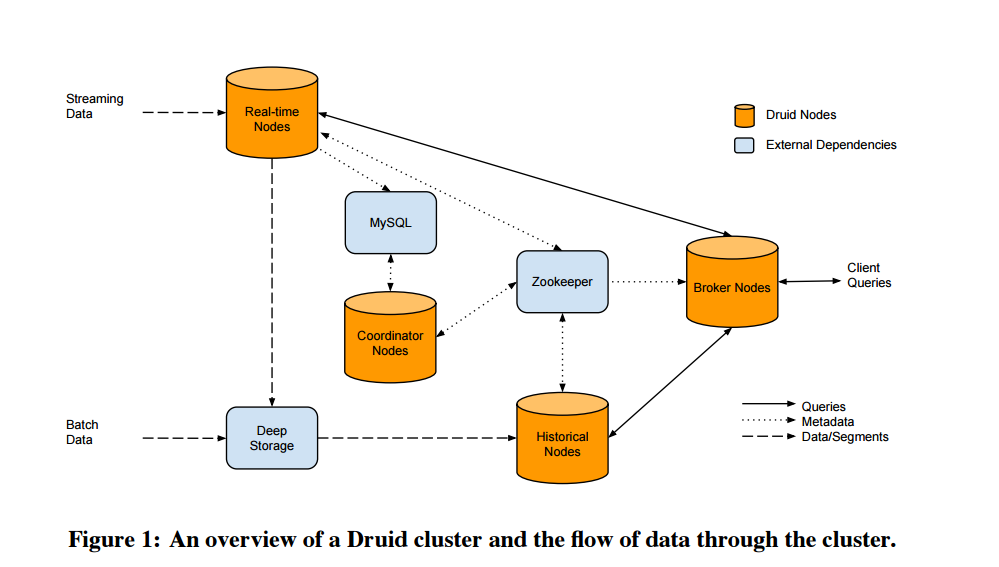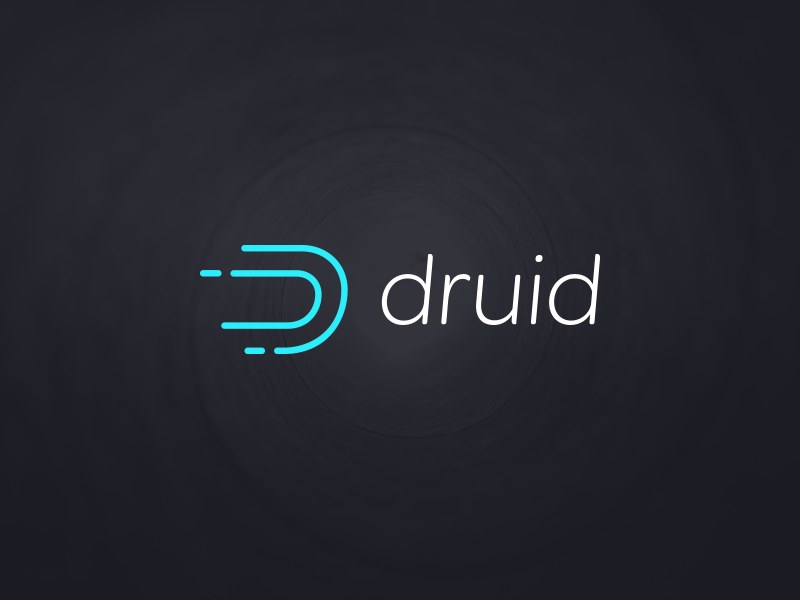

Yahoo is in the process of implementing a big data tool called Druid to power high-speed real-time queries against its massive Hadoop-based data lake. Engineers at the Web giant say the open source database’s combination of speed and usability on fast-moving data make it ideal for the job.
Druid is a column-oriented in-memory OLAP data store that was originally developed more than four years ago by the folks at Metamarkets, a developer of programmatic advertising solutions. The company was struggling to keep the Web-based analytic consoles it provides customers fed with the latest clickstream data using relational tools like Greenplum and NoSQL databases like HBase, so it developed its own distributed database instead.
The core design parameter for Druid was being able to compute drill-downs and roll-ups over a large set of “high dimensional” data comprising billions of events, and to do so in real time, Druid creator, Eric Tschetter wrote in a 2011 blog post introducting Druid. To accomplish this, Tschetter decided that Druid would feature a parallelized, in-memory architecture that scaled out, enabling users to easily add more memory as needed.
Druid essentially maps the data to memory as it arrives, compresses it into a column, and then builds indexes for each column. It also maintains two separate subsystems: a read-optimized subsystem in the historical nodes, and a write-optimized subsystem in real-time nodes (hence the name “Druid,” a shape-shifting character common in role playing games). This approach lets  the database query very large amounts of historical and real-time data, says Tschetter, who left Metamarkets to join Yahoo in late 2014.
the database query very large amounts of historical and real-time data, says Tschetter, who left Metamarkets to join Yahoo in late 2014.
“Druid’s power resides in providing users fast, arbitrarily deep exploration of large-scale transaction data,” Tschetter writes. “Queries over billions of rows, that previously took minutes or hours to run, can now be investigated directly with sub-second response times.”
Metamarkets released Druid as an open source project on GitHub in October 2012. Since then, the software has been used by a number of companies for various purposes, including as a video network monitoring, operations monitoring, and online advertising analytics platform, according to a 2014 white paper.
Netflix was one of the early companies testing Druid, but it’s unclear if it implemented it into production. One company that has adopted Druid is Yahoo, the ancestral home of Hadoop. Yahoo is now using Druid to power a variety of real-time analytic interfaces, including executive-level dashboards and customer-facing analytics, according to a post last week on the Yahoo Engineering blog.
Yahoo engineers explain Druid in this manner:
“The architecture blends traditional search infrastructure with database technologies and has parallels to other closed-source systems like Google’s Dremel, Powerdrill and Mesa. Druid excels at finding exactly what it needs to scan for a query, and was built for fast aggregations over arbitrary slice-and-diced data. Combined with its high availability characteristics, and support for multi-tenant query workloads, Druid is ideal for powering interactive, user-facing, analytic applications.”
Yahoo landed on Druid after attempting to build its data applications using various infrastructure pieces, including H adoop and Hive, relational databases, key/value stores, Spark and Shark, Impala, and many others. “The solutions each have their strengths,” Yahoo wrote, “but none of them seemed to support the full set of requirements that we had,” which included adhoc slice and dice, scaling to tens of billions of events a day, and ingestion of data in real-time.
adoop and Hive, relational databases, key/value stores, Spark and Shark, Impala, and many others. “The solutions each have their strengths,” Yahoo wrote, “but none of them seemed to support the full set of requirements that we had,” which included adhoc slice and dice, scaling to tens of billions of events a day, and ingestion of data in real-time.
Another property of Druid that caught Yahoo’s eye was its “lock-free, streaming ingestion capabilities.” The capability to work with open source big data messages busses, like Kafka, as well as working with proprietary systems, means it fits nicely into its stack, Yahoo said. “Events can be explored milliseconds after they occur while providing a single consolidated view of both real-time events and historical events that occurred years in the past,” the company writes.
As it does for all open source products that it finds useful, Yahoo is investing in Druid. For more info, see the Druid website at http://druid.io.
Related Items:
The Real-Time Future of Data According to Jay Kreps
Glimpsing Hadoop’s Real-Time Analytic Future
Druid Summons Strength in Real-Time
August 27, 2025
- Apache Software Foundation Expands Tools, Governance, and Community in FY2025
- Coalesce Launches JOIN Community Discussions on Data Strategy and AI
- Alluxio Reports Q2 Growth as Enterprise AI 3.7 Advances AI Data Performance
- OpenText and Ponemon Institute Survey of CIOs Finds Lack of Information Readiness Threatens AI Success
- Domo Announces Enhanced Cloud Integration Capabilities with BigQuery
August 26, 2025
- MariaDB Accelerates Cloud Deployments, Adds Agentic AI and Serverless Capability with Acquisition of SkySQL
- OpenLight Raises $34M Series A to Scale Next-Gen Integrated Photonics for AI Data Centers
- Domo Unveils Enhanced Cloud Integration Upgrades for Snowflake
- NVIDIA: Industry Leaders Transform Enterprise Data Centers for the AI Era with RTX PRO Servers
- Hydrolix Accelerates Growth with $80M Series C
- Ai2 Launches Asta: A New Standard for Trustworthy AI Agents in Science
- IDC: Agentic AI to Dominate IT Budget Expansion Over Next 5 Years, Exceeding 26% of Worldwide IT Spending, and $1.3T in 2029
August 25, 2025
- Fivetran and S3NS Partner to Bring Secure Data Movement to Regulated Industries Across Europe
- Lightbits to Showcase Software-Defined Storage for OpenShift at Red Hat Connect
August 22, 2025
- Definite Raises $10M Seed Round to Deliver AI-Native Data Stack for Modern Businesses
- SurrealDB Launches SurrealMCP, Bringing AI Agents Secure, Real-Time Memory
- Domino Data Lab Expands Strategic AI Partnership with UBS
- Transcend Expands ‘Do Not Train’ and Deep Deletion to Power Responsible AI at Scale for B2B AI Companies
- TinyFish Launches with $47M to Define the Era of Enterprise Web Agents
August 21, 2025
- Rethinking Risk: The Role of Selective Retrieval in Data Lake Strategies
- Why Metadata Is the New Interface Between IT and AI
- What Are Reasoning Models and Why You Should Care
- LinkedIn Introduces Northguard, Its Replacement for Kafka
- Why OpenAI’s New Open Weight Models Are a Big Deal
- LakeFS Nabs $20M to Build ‘Git for Big Data’
- Doing More With Your Existing Kafka
- What Is MosaicML, and Why Is Databricks Buying It For $1.3B?
- Beyond Words: Battle for Semantic Layer Supremacy Heats Up
- Meet Vast Data CEO Renen Hallak, a 2024 BigDATAwire Person to Watch
- More Features…
- Mathematica Helps Crack Zodiac Killer’s Code
- BigDATAwire Exclusive Interview: DataPelago CEO on Launching the Spark Accelerator
- Solidigm Celebrates World’s Largest SSD with ‘122 Day’
- McKinsey Dishes the Goods on Latest Tech Trends
- GigaOm Rates the Object Stores
- Promethium Wants to Make Self Service Data Work at AI Scale
- The Top Five Data Labeling Firms According to Everest Group
- Google Pushes AI Agents Into Everyday Data Tasks
- Oracle Launches Exadata Service for AI, Compliance, and Location-Critical Workloads
- Databricks Now Worth $100B. Will It Reach $1T?
- More News In Brief…
- Gartner Predicts 40% of Generative AI Solutions Will Be Multimodal By 2027
- Seagate Unveils IronWolf Pro 24TB Hard Drive for SMBs and Enterprises
- LF AI & Data Foundation Hosts Vortex Project to Power High Performance Data Access for AI and Analytics
- Deloitte Survey Finds AI Use and Tech Investments Top Priorities for Private Companies in 2024
- Dell Unveils Updates to Dell AI Data Platform
- Stack Overflow’s 2025 Developer Survey Reveals Trust in AI at an All Time Low
- Redpanda Partners with Databricks to Deliver One‑Step Stream‑to‑Table Iceberg Integration for Real‑Time Lakehouses
- Computing Community Consortium Outlines Roadmap for Long-Term AI Research
- Transcend Expands ‘Do Not Train’ and Deep Deletion to Power Responsible AI at Scale for B2B AI Companies
- Treasure Data Builds Out AI Agent Foundry with Amazon Bedrock Support
- More This Just In…







































